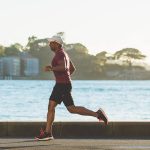According to a team of researchers from the University of Virginia, physical activity can protect individuals against the consequences of the new coronavirus. Exercising looks particularly beneficial for the acute respiratory distress syndromes that are at the heart of the complications of COVID-19. Further explanation ahead.
Coronaviruses and COVID-19 in particular are still largely unknown and scientific research is just beginning to understand the specifics about how they work exactly. To cure or protect oneself from the disease, new paths are emerging everywhere: drugs, anti-virals, vaccines… Among them, there is a particularly interesting path: the one explored by researchers from the University of Virginia in which physical activity seems to play a protective role against coronavirus.
Published in March 2020, this study explores the effects of physical activity on the production of certain antioxidants that might have a protective effect against a number of diseases and health problems, a number of which are part of the consequences of COVID-19 Here’s what they found out.
Physical Activity, Antioxidants, and Health Protection
First, it should be noted that the study by Zhen Yan and his colleagues from the University of Virginia does not strictly relate to the coronavirus. It is a review that tries to understand the effect of physical activity on the production of certain antioxidants and its consequences on health. However, the results of this review lead researchers to think that physical activity could have a protective role against coronavirus.
What the study shows is that physical activity tends to increase the production of an antioxidant called extracellular superoxide dismutase (EcSOD). This extra-cellular antioxidant would play a fundamental role in the body’s defense mechanisms in the context of several cardiac, pulmonary, and even hepatic pathologies.
In particular, the researchers observed that there was a close link between the amount of EcSOD circulating in the body and the severity of acute respiratory distress syndromes or oxidative stress syndromes of the pulmonary system.
Physical Activity Helps Prevent the Consequences of Coronavirus
The syndromes mentioned above are precisely the ones at the heart of the complications linked to the coronavirus. A large percentage of patients admitted to intensive care for severe cases of Covid-19 disease have acute respiratory distress syndromes, and a large part of the mortality associated with COVID-19 is attributable to these respiratory complications.
This is why at the beginning of the study, Zhen Yan, declares that regular physical activity, along with social distancing measures, should be part of the preventive measures applied to limit the health consequences of the new coronavirus.
In addition, EcSOD (the antioxidant) could also play a protective role in the event of inflammatory syndromes. By blocking the action of superoxides (free radicals) these antioxidants could limit the occurrence of the famous “cytokine storms” which are the source of many complications linked to the new coronavirus.
Exercising May Improve Our Health and Help Fight Coronavirus Symptoms
As we’ve mentioned before, this study is not specifically about the COVID-19 disease and it would, therefore, be premature to think exercising is assured remedy in physical activity against its consequences. This would require real studies with specific protocols.
However, the evidence highlighted by this study and the recent scientific corpus on this subject both converge to suggest that regular physical activity is likely to strengthen the body’s ability to defend itself against a broad spectrum of infections, viruses, and diseases.
In this specific case, the researchers go so far as to think that a better understanding of the role of physical activity and the antioxidants that it produces could help doctors with coronavirus and with therapeutic and rehabilitation protocols.
In any case, this is another reason to continue playing sports, while maintaining social distancing.

